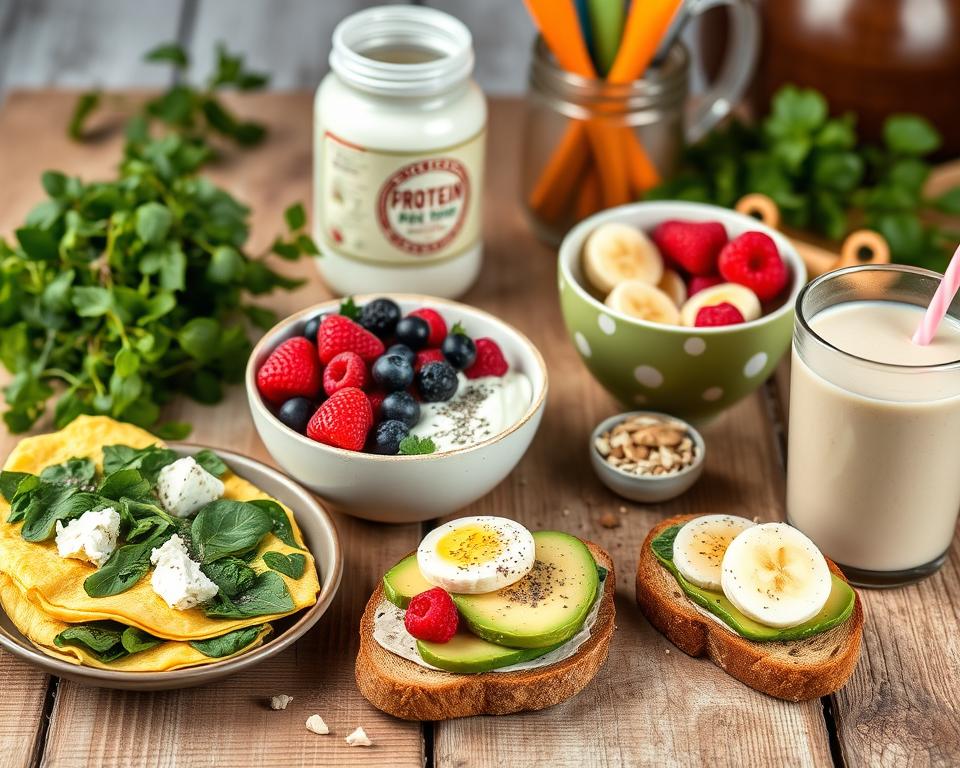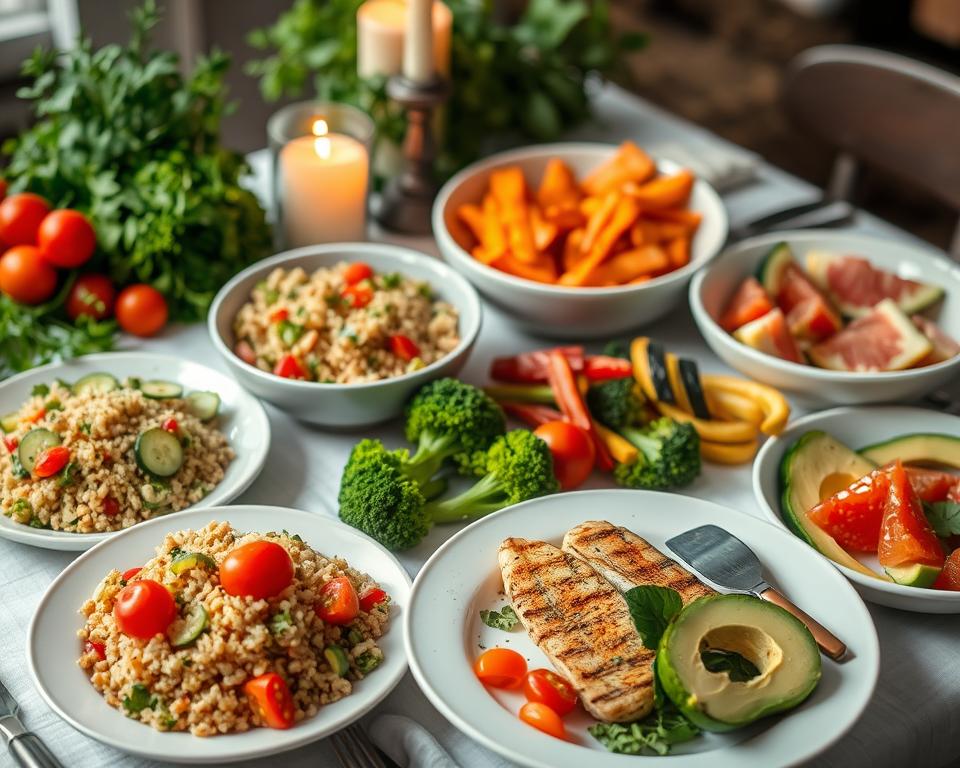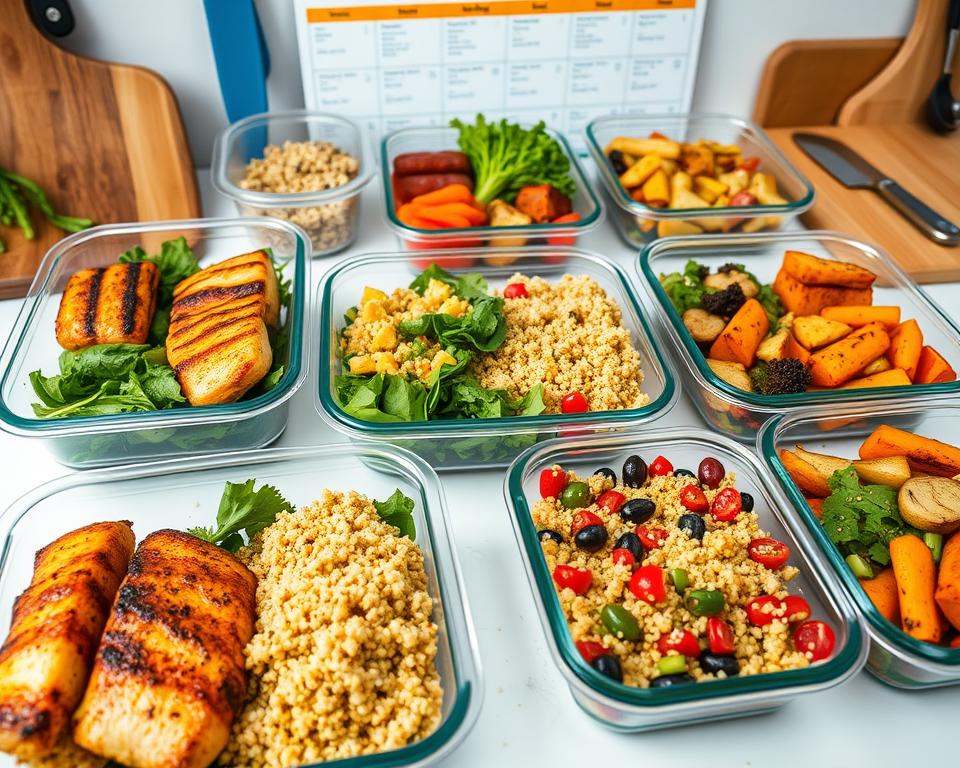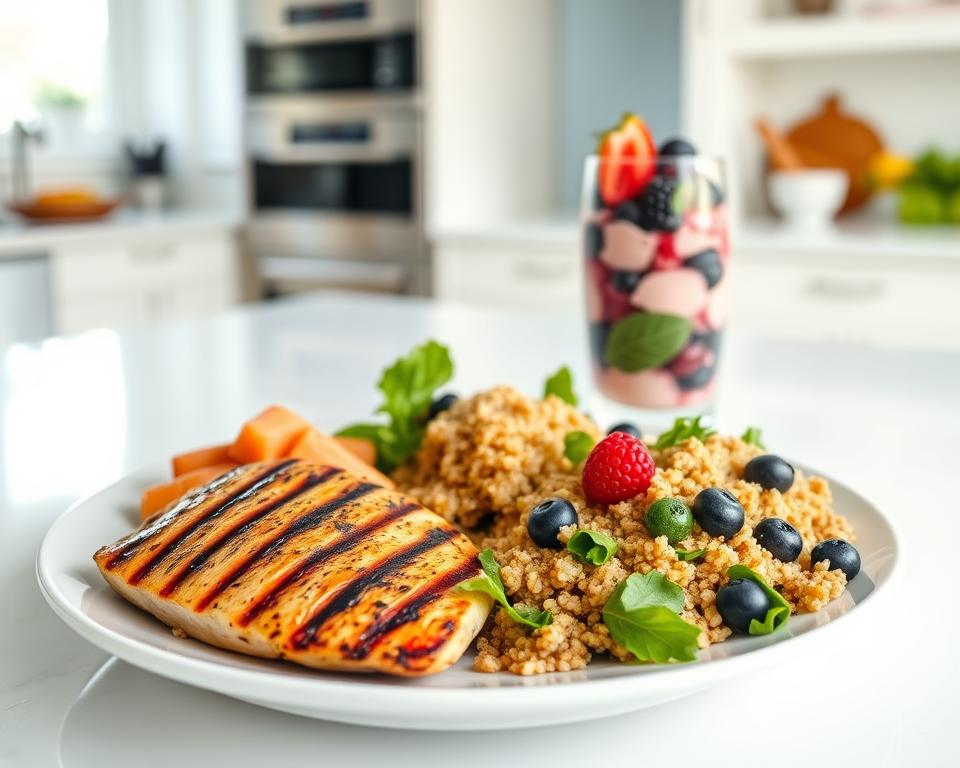Starting a weight loss journey after gastric bypass surgery can be tough. You might think it’s hard to enjoy food and stay healthy. But, bariatric recipes are here to help. They offer tasty, healthy meals that support your health goals.
Don’t worry, you won’t have to give up flavor. These special weight loss recipes are made to nourish you and make you feel good. Every bite helps you heal and get your health back.
Your diet after surgery isn’t about cutting out food. It’s about eating smart and nutritious meals. Imagine enjoying meals that help you lose weight and feel great. Gastric bypass meals can be exciting and full of nutrients.
check out Stay Snatched’s seafood mac and cheese recipe, which offers a delicious take on this comforting classic.
Key Takeaways
- Bariatric recipes are tailored to support nutritional needs after weight loss surgery
- Meals can be delicious while maintaining portion control
- Focus on high-protein, nutrient-dense ingredients
- Variety is key to maintaining motivation in your diet
- Proper nutrition is critical for successful post-surgery recovery
Understanding Post-Surgery Nutrition Requirements
Starting your bariatric surgery journey means big changes in how you eat. Your body needs special care to heal and get better after surgery.
Caloric Needs After Surgery
Your diet will change a lot after surgery. You’ll focus on eating high-quality foods, not just a lot of them. At first, you’ll eat about 300-600 calories a day.
- Liquid phase: 60-80 grams of protein daily
- Pureed food phase: Keep 60-80 grams protein intake
- Choose high protein low carb foods that are full of nutrients
Essential Nutrients for Recovery
After surgery, you’ll need vitamin fortified supplements. They help keep your body from lacking important nutrients.
| Supplement | Daily Recommended Intake | Purpose |
|---|---|---|
| Multivitamin | 1 tablet | Overall nutrient support |
| Calcium Citrate | 1200-1500mg | Bone health |
| Vitamin B12 | 350-500mcg | Neurological function |
| Iron | 45-60mg | Prevent anemia |
Portion Control Guidelines
Learning to control your portions is key to losing weight. Your stomach will be much smaller, so you need to plan your meals carefully.
“Your plate is now your most powerful tool for healing and transformation.” – Bariatric Nutrition Expert
- Vegetables: ½ cup per meal
- Protein: 3-4 ounces per meal
- Fruits: ½ cup, choose low-sugar ones
- Carbohydrates: ¼ cup per meal
Good nutrition after bariatric surgery isn’t about cutting out food. It’s about eating mindfully and choosing foods that help you stay healthy and lose weight.
Getting Started with Bariatric Recipes
Starting your bariatric journey means planning your nutrition carefully. Your success begins with knowing the diet stages after surgery. You’ll start with a liquid diet, then move to soft foods to help you heal and lose weight.
“Nutrition is the foundation of your recovery and long-term success after bariatric surgery.” – Nutrition Experts
Your first weeks will be about eating bariatric-friendly meals. These meals are easy to digest and help you absorb nutrients well. Here’s what your diet will look like:
- Liquid Diet Phase: Clear and full liquids for immediate post-surgery nutrition
- Soft Diet Phase: Pureed and soft foods that are gentle on your healing stomach
- Solid Food Introduction: Carefully planned protein-rich meals
Important things to keep in mind for your bariatric recipe journey include:
- Work closely with your healthcare team
- Focus on high-protein, low-calorie options
- Practice portion control
- Stay hydrated
The Definity Tool Kit Bariatric Surgery suggests joining a cooking community. Sharing recipes and tips can make your nutrition journey more enjoyable and sustainable. Being part of a group can give you motivation, emotional support, and new ideas for staying healthy.
Essential Kitchen Tools and Ingredients
Starting your bariatric journey in the kitchen is key. The right tools and ingredients make meal prep easier and fun. Having the right equipment and pantry items will help you cook bariatric-friendly meals well.
Must-Have Cooking Equipment
Your kitchen should have tools that are precise and efficient:
- Digital food scale for accurate portion control
- Small plates to manage serving sizes
- Blender for smoothies and purées
- Multipurpose cooker for versatile meal preparation
- Food processor for quick ingredient preparation
Pantry Staples for Success
Fill your pantry with nutrient-dense ingredients:
| Category | Recommended Items |
|---|---|
| Proteins | Protein powders, canned tuna, chicken, beans |
| Liquids | Low-sodium broths, unsweetened almond milk |
| Flavorings | Sugar-free seasonings, herbs, spices |
Protein-Rich Food Options
Choose a variety of protein sources:
- Lean Proteins: Chicken, turkey, fish, eggs
- Dairy: Greek yogurt, cottage cheese
- Plant-Based: Tofu, legumes, quinoa
- Healthy Fats: Avocado, olive oil, nuts
“Proper preparation prevents poor performance in your bariatric nutrition journey.”
High-Protein Breakfast Options
Making a great bariatric friendly breakfast can change your weight loss path. Protein is key for keeping muscle and feeling full in the morning. A breakfast high in protein and low in carbs helps control blood sugar and gives lasting energy.

For bariatric patients, breakfast should be packed with nutrients but not too many calories. Studies show eating 15 to 30 grams of protein at breakfast boosts metabolism and aids in weight loss.
Top High-Protein Breakfast Ideas
- Greek Yogurt Protein Smoothie
- Spinach for added nutrients
- Protein powder for extra protein boost
- Low-calorie option for weight management
- Scrambled Egg Variations
- Approximately 19g protein per serving
- Only 180 calories
- Nutrient-rich preparation
- Overnight Protein Oats
- Greek yogurt base
- Chia seeds for additional nutrition
- Small fruit portion for natural sweetness
“Protein digestion requires 20-30% of consumed energy, making it an excellent metabolism booster” – 2020 Journal of Obesity and Metabolic Syndrome
Try Maple Brown Sugar Protein Oatmeal for a high-protein, low-calorie breakfast. It has 15g of protein, 100 calories, and 6g of carbs. It’s perfect for bariatric patients looking for easy, healthy breakfasts.
| Breakfast Option | Protein (g) | Calories | Carbs (g) |
|---|---|---|---|
| Greek Yogurt Smoothie | 20 | 150 | 8 |
| Scrambled Eggs | 19 | 180 | 2 |
| Protein Oatmeal | 15 | 100 | 6 |
Your morning meal is key to nutritional success. Choose high-protein, low-carb options to support your bariatric journey and keep your energy up.
Nutrient-Dense Lunch Solutions
Making the right gastric bypass meals is key. Your lunch should be high in protein and low in carbs. This helps with healing and managing weight.
Bariatric patients need meals that are full of nutrients but small in size. About 85% of patients find these meals help them lose weight.
Quick Prep Lunch Ideas
Quick, healthy lunches can help your recovery. Here are some protein-rich options:
- Grilled chicken quinoa salad
- Turkey and vegetable soup
- Lettuce wraps with tuna and avocado
Make-Ahead Meal Options
Meal prepping keeps you on track with your diet. It makes sure you always have healthy lunches ready.
| Meal Option | Protein (g) | Calories |
|---|---|---|
| Chicken Quinoa Salad | 30g | 300 |
| Turkey Vegetable Soup | 25g | 250 |
| Tuna Lettuce Wraps | 35g | 280 |
Portion-Controlled Packaging Tips
Your lunch should be small to fit your stomach. Use small containers and measure your food. Aim for 250-350 calories with 25-35g of protein.
Remember: Nutrient density matters more than quantity after bariatric surgery.
Choose high-quality, protein-rich foods for your meals. This way, you’ll enjoy meals that help with weight loss and nutrition.
Dinner Recipes That Support Weight Loss

Making tasty weight loss recipes for gastric bypass patients is all about creativity and knowing what’s good for you. Your dinner can help you reach your health goals. Choose high protein low carb meals that are both tasty and healthy.
The CDC says fruits and veggies are key for keeping weight in check. Let’s look at dinner ideas that are full of nutrients and help you lose weight.
- Lean Protein Options:
- Baked salmon with roasted asparagus
- Grilled chicken with Mediterranean herb seasoning
- Turkey medallions with cauliflower rice
- Low-Carb Vegetable Alternatives:
- Zucchini noodles with marinara
- Cauliflower stir-fry
- Spaghetti squash with lean protein
How you cook matters a lot for keeping food healthy. Choose:
- Baking
- Grilling
- Steaming
“Food is not just fuel, it’s information that tells our bodies how to function.” – Anonymous Nutritionist
Your meals after gastric bypass should be packed with nutrients. Try quinoa instead of rice, and chickpea pasta for more protein. Also, try plant-based proteins to keep things interesting and healthy.
Weight loss isn’t about cutting out food. It’s about making smart, tasty choices that help you get healthier.
Smart Snacking Strategies
Choosing snacks after bariatric surgery needs careful thought. Your snack choices greatly affect your nutrition and weight goals. Look for snacks that are high in protein and low in carbs. These help with recovery and keep your energy up.
Good snacking after surgery involves three key things: protein, portion size, and timing. Knowing these helps you make better food choices. This supports your health journey.
Protein-Rich Snack Ideas
Your snacks should have lots of protein to help muscles heal. Here are some good choices:
- Greek yogurt with berries (15-20g protein)
- Cottage cheese with pineapple chunks
- Hard-boiled eggs
- Protein smoothies
- Low-fat cheese sticks
Portion Control for Snacks
It’s important to control snack sizes. Aim for servings of 1/4 to 1/2 cup. Use measuring cups or special containers to keep sizes right.
Timing Your Snacks
Snack timing is key to avoid blood sugar spikes and eating too much. Eat small, protein-rich snacks between meals. This keeps your energy steady and meets your body’s needs. Plan for 1-2 snacks a day, about 2-3 hours apart.
“Snacking smartly is about quality, not quantity” – Bariatric Nutrition Expert
Your post-surgery diet needs careful watching. Focus on snacks that are high in protein and low in carbs. This helps you reach your health goals and keeps your energy up all day.
Meal Prep Tips for Bariatric Success
Learning to prepare meals is key for your bariatric journey. Good meal prep makes your weight loss recipes easy to follow. It helps you stay on track with your health goals.

Meal prep helps you control portions and follow your bariatric recipes. Here are some tips to make meal planning easier:
- Invest in portion-controlled containers
- Batch cook lean proteins
- Pre-chop vegetables for quick meals
- Freeze individual meal portions
“Preparation is the key to success in your weight loss journey.”
Your weekly meal prep should include nutrient-rich foods. Focus on a protein-packed meal plan that fits your dietary needs.
| Protein Source | Serving Size | Protein Content |
|---|---|---|
| Grilled Chicken Breast | 3 oz | 26g |
| Hard-Boiled Eggs | 2 eggs | 12g |
| Greek Yogurt | 6 oz | 15g |
Use these tips to make your bariatric recipes easy and tasty. Remember, successful meal prep is about creating sustainable habits that support your long-term health goals.
- Plan your menu weekly
- Use slow cookers for easy meal preparation
- Keep healthy snacks readily available
- Track your nutritional intake
Adapting Family Favorites into Bariatric Recipes
Making tasty weight loss recipes that feel like home can make your bariatric journey fun. Turning family favorites into high protein low carb meals doesn’t mean losing taste or comfort.
Smart ingredient swaps are key to making bariatric recipes that taste great and support your health goals. Try these creative swaps:
- Replace white rice with cauliflower rice
- Swap pasta for zucchini noodles
- Use Greek yogurt instead of sour cream
- Choose lean proteins over fatty meats
Flavor is important in bariatric recipes. Use herbs and spices to add taste without extra calories. Your meals can be both healthy and tasty.
*”Healthy eating is not about perfection, but making better choices consistently.”*
| Traditional Ingredient | Bariatric Substitute | Protein Boost |
|---|---|---|
| Regular Pasta | Zucchini Noodles | Add Grilled Chicken |
| White Rice | Cauliflower Rice | Mix with Tofu |
| Cream Sauce | Greek Yogurt Base | Incorporate Protein Powder |
Remember, controlling portions is key in your bariatric journey. Eating smaller, protein-rich meals helps you keep your weight loss goals. And you get to enjoy familiar flavors.
With its forgiving recipe, is perfect for beginners and expert bakers alike. Learn more tips and tricks from this resource.
Conclusion
Starting a post-surgery diet needs dedication and creativity. Your bariatric recipes are more than food. They are a smart way to eat and heal.
Weight loss recipes for gastric bypass patients are key. They help you get the nutrients you need while your body heals and changes.
Learning about portion control, protein, and nutrient-rich meals is important. Try to eat 60-75 grams of protein each day. Also, eat foods rich in calcium and vitamins that help your metabolism.
Right meals for gastric bypass can greatly improve your health journey.
Getting used to new eating habits takes time. Every meal you make is a step towards your health goals. Support groups, expert nutrition advice, and planning meals help you on this journey.
Your hard work in eating mindfully and choosing the right foods will help you lose weight and feel better.
Keep going, stay updated, and celebrate your nutritional wins. Your bariatric recipes are about more than losing weight. They help you become a healthier, happier you.

